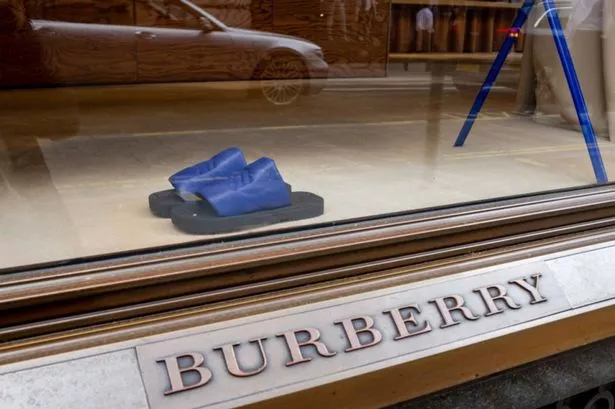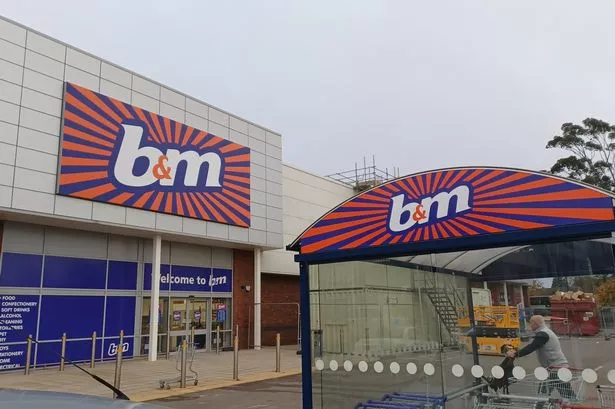
Bridesmaids often get to keep their glamorous gowns after fulfilling their duties at weddings, but that wasn’t to be the case at Isabella West’s nuptials.
The confetti had barely been cleared after her Newcastle wedding to Dom Waldouck before the fashion entrepreneur was asking her bridesmaids to give her their dresses . Within days they had been dry cleaned and put up for rent. As the founder of a fashion rental business Hirestreet, Isabella could see an opportunity was to be had.
Thanks to her app and website, those four dresses went on to make an appearance at many more weddings - helping her to enlist the brand behind them as one of Hirestreet’s clients.
Isabella said: “I bought my bridesmaids dresses from the team at Vesper, and then asked my bridesmaids for them back and rented them on Hirestreet. They were not thrilled. But they did really well so I went to Vesper with the data, told them they’d been worn at 20 different weddings, said please can I have some of your stock? And they said yes. Three of the bridesmaids were my sisters so they didn’t have a choice, and my best friend was the most compliant - they should have known.
“My dress? I was not very good and careful in it. I bought my dress second-hand and basically accidentally ruined it otherwise I would have rented it out. This is really embarrassing but I ended up in Cosy Joe’s in the Bigg Market on my wedding night - it is not white, it looks like I’ve been standing in oil.”
While her bridesmaids might not have been completely happy, Isabella’s opportunity-seizing move represents how her innovative thinking is helping Hirestreet to make its mark within the sustainable fashion sector.
The award-winning entrepreneur, 31, established Hirestreet in 2018 as response to the growing fast fashion industry. Through the Hirestreet app and website, customers rent outfits rather than buy clothes they would likely only wear a handful of times.
The company, launched with just a few of Ms West’s own dresses, now rents out thousands of outfits every week through its own website, and it has also joined forces with major retailers through its white label platform Zoa Rental, which works with brands including Asos, M&S, French Connection, River Island, Oasis, Nobody’s Child, Lipsy and Decathlon. Three new brands brought on board this week along including Kiwi and Co, Glamorous and Vesper, makers of her bridesmaids’ dresses.
Today, the Newcastle company has 11 staff, with the North East employees – predominantly technical staff – working remotely, while the marketing team is in London. The team is dealing with new challenges, notably the never-ending struggles of the UK retail sector and a drop in consumer spending, a challenge compounded by the growing global march of online juggernauts Temu and Shein.
Isabella, who splits her time between staff in London and Newcastle, Cheltenham and the company warehouse in Glasgow, has always worked hard to keep one step ahead of trends, but says the constantly shifting world of fashion in the last year is proving particularly problematic to navigate.
She said: “It’s a really difficult trading environment for the majority of retailers because I feel we are in quite unchartered territory with the rise of Shein and Temu - these Chinese brands which are very heavily-discounted and becoming increasingly direct-to-consumer focused. There’s no part of the market that’s having it super easy.
“What we are seeing is a bit of a ‘say-do’ gap – between what consumers say and where they are actually placing their spend. We hear all the time that sustainability is important to the consumer, but that’s not really reflective of what’s increasing volume of spend with those ultra-fast fashion players.
“There’s an interesting angle in which we have a lot of consumers shifting towards ‘experience’ spend. It’s hard to put into words, but in a nutshell people tell us they don’t want to shop unsustainably this Christmas, but they’ll potentially consider getting matching pyjamas for the experience and feelgood factor.
“Whereas people used to buy outfits and wear them once for a wedding, or an event, there’s more and more of this experience-led feelgood fashion moments.”
She explained how, amidst these shifting trends, retailers have the tough task of deciding how much stock to order.
“They will be sitting there wondering what orders to place for this time next year,” she said. “You’ve got to try to predict not only what is in fashion, but also how much of it to get. It’s a really difficult task.
“Shoppers are also very influenced by TikTok and Instagram trends – like the colour burgundy - which can totally shift a button on trend. This all makes it really difficult for retailers to know which stock to put bets on. It’s always been a challenge but it’s harder than ever because of social rules which mean trends can change so fast.”
One extremely popular addition to the firm’s services is subscriptions, an area which has seen astronomical growth. Subscriptions could prove to be the answer to the challenge of stock for retailers, because it means that fashion items from several seasons can be used in monthly boxes.
In October - a year after first announcing a partnership with ASOS – Hirestreet announced the firms had come together to launch a subscription rental service, in which subscribers rent five items a month for £75. Subscribers can choose from over 20,000 ASOS items, from its £250 ASOS Luxe gowns, to £170 Columbia puffers.
The collaboration came after Hirestreet saw a big leap in demand for casual items in the first quarter of 2024 and now, two months after launching, Hirestreet is welcoming 20 new subscribers every day. In fact, the company will soon have to close the book on new subscriptions because the mathematics of the stock available for the subscribers means only so much can be used for the monthly boxes before it runs out.
Isabella said: “We’ve shifted our business model to subscriptions and that has been very interesting for us In one review a customer said ‘I love my subscription box because it feels like Christmas every month’. 79% of women feel most confident wearing something new, which is a feeling we can all relate to. That’s been the case for occasionwear since we started six years ago.
“But what we’ve seen evolve over the last two years is that feeling for a greater share of your wardrobe. For the first time ever last week subscribers rented more coats than dresses - that’s a massive shift for us. We have never not seen dresses as the dominant category.
“We’re starting to see a world of people who are excited by a subscription model where they are getting five items a month. Demand has been off the charts. By January we’ll hit our year one target and we only launched in October. We only launched it as a test - I wasn’t sure people would pay every month but it’s been a phenomenal response and I’m still trying to figure out why!”
The use of technology has always been paramount for Hirestreet, and the business recently migrated a lot of their customer services to WhatsApp. At the moment, Isabella and the team are trying to do what they can using AI to build ‘chat flows’ to answer simple queries, or to identify if customers need to speak to a team member.
Just one person is managing the WhatsApp system at the moment, and Isabella’s gut feeling is more staff will be needed, although it is early days at the moment. In this early stage, Isabella herself often also jumps in to answer WhatsApp queries - although customers don’t know this.
She said: “We’re doing a lot to try to understand the consumer model and shifting a lot of customer service to WhatsApp has been a blessing and a curse. On WhatsApp they will tell us about their whole month of plans, their size, what they had for breakfast - it’s unbelievable the conversations we can now have with customers. That is amazing, and such a shift in information exchange. However we need to address the resource challenge of it.
“In the early days of WhatsApp I was talking to a customer and she was asking some questions on the fit of some dresses. I replied ‘I’ve actually worn this one - it’s a really lovely fit’ and she replied ‘Are you a bot? I thought the whole time you were a bot!”. I said no, bots don’t get dressed! I nearly replied saying I’m actually the CEO but I didn’t. It just demonstrates the amount of information customers are happy to share with us though.”
Looking into 2025, the Hirestreet team is gearing up for a busy time, not least of all because of the huge rise in subscribers, thereby creating recurring revenue.
Isabella said: “We’ve been focusing more on profitability after building out in the first few years, after focusing on scale. A lot of businesses will have done this with the changing nature of economy, as opposed to growth at all costs. Ultimately it’s why we pivoted towards subscription.
Recent
See All2025-04-10
List of shops that have gone into administration in 2024
2025-04-10
Gloucester Quays signs 20 deals with retailers including Clarks and Le Creuset
2025-04-10
Luxury brands like Burberry set for a rebound - but bosses are still pessimistic
2025-04-10
Titanic Belfast's remarkable growth after shift in consumer demand post-Covid
2025-04-10
Edinburgh Hogmanay street party and fireworks cancelled due to bad weather
2025-04-10
B&M hires chief executive of Iron Bru maker as it battles slumping share price
2025-04-10
Boohoo hits back at Frasers after Mike Ashley demands board seat
2025-04-10
What regeneration plans could mean for the last Wimpy in the North West
2025-04-10
UK water customers to receive up to £2000 in compensation
2025-04-10
Thames Water faces backlash for allegedly using environmental funds for bonuses and dividends
Newsletter
Get life tips delivered directly to your inbox!










